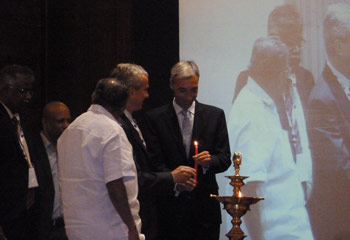| |
SEASON’S GREETINGS

As New Year approaches, I would like to take the opportunity to look over the MPC research highlights of 2013 and share with you our research agenda.
The MPC flagship programmes are the observatories on migration and we remain keen on continuing and developing their activities. Following on from the observatory on migration in the EU Southern neighbourhood (CARIM-South), the EU Eastern neighbourhood observatory (CARIM-East) and the India-EU migration observatory (CARIM-India) are now completely in place and provide research findings on a large range of issues within three different frameworks: demographic/economic, legal and socio-political. Building on the research conducted by the MPC within the framework of these observatories, we have published the first set of migration country profiles covering the whole EU Southern and Eastern Neighbourhood in our ‘EU Neighbourhood Migration Report 2013’. I am also very pleased to announce the new observatory on the Gulf States (Gulf Labour Markets and Migration).
I am proud to announce, too, the first large-scale research on migrants’ integration in European societies in the light of the links kept with origin countries (INTERACT). A survey covering all 28 EU member States, as well as the 59 third countries with more than 100,000 EU-based migrants, started in December.
The MPC continued to work on key migration issues for the future of Europe:
We also launched, in November, a project in cooperation with the European Training Foundation (ETF), on migration support measures from an employment and skills perspective ( MISMES). In addition, we will soon start a project on the judicial control of the detention of illegal migrants under the return directive (CONTENTION).
The MPC completed a project on refugee resettlement in the EU ( KNOW RESET project) and provided an inventory of EU responses to refugee crisis in the Arab region (see working paper “ A Comparative Study on the Asylum Landscapes within the EU for Iraqis after the 2003 Iraq War and Syrians after the 2011 Syrian Civil War” by Christine Fandrich).
In addition to research, our team contributes to policy debates at the EU level. We were, for example, consulted by the Mediterranean Task force, set up by the European Commission following the Lampedusa tragedy of 3 October 2013 (see MPC report ‘Migrants smuggled by sea to the EU: facts, laws and policy options’). Our team is now actively involved in the evaluation and the follow-up of the Stockholm programme.
I would like to thank the MPC team based in Florence and its scientific network of around 200 correspondents around the world for the invaluable work they have conducted over the past year and I am looking forward to a new year of exciting projects and challenges. Finally, on behalf of the MPC team, I wish you and your family wonderful holidays and peace and happiness in 2014.
Sincerely,
Philippe Fargues, Director of the Migration Policy Centre
|
Report on Migrants smuggled across the Mediterranean to the EU

On 3 October 2013, 366 migrants drowned when their boat sank less than a mile off the shore of the Italian island of Lampedusa. A number of questions must be addressed in finding the best policy response to this tragedy. Was it the sign of a new trend in irregular migration to the EU; or was it, instead, a sign of increased risks associated with smuggling? Do smuggled migrants resemble regular asylum seekers and migrants or do they represent a specific group? In other words, do the Lampedusa events call for a drastic revision of EU asylum and migration policy or an ad hoc response? These are some of the questions asked in the research report 'Migrants smuggled by sea to the EU: facts, laws and policy options' by Philippe De Bruycker, Anna Di Bartolomeo and Philippe Fargues. Articles have been written on the back of this report in La Repubblica (Italian newspaper) and on ANSAmed’s website.
|
Gulf Labour Markets and Migration programme - GLMM

The MPC inaugurated, in November, a pilot observatory on the Gulf countries, a project conducted with the Gulf Research Center (GRC). The Gulf Labour Markets and Migration (GLMM) programme provides data, analyses, and recommendations for the improvement of understanding and management of Gulf labour markets and migration, engaging with and respecting the viewpoints of all stakeholders.
The Gulf Labour Markets and Migration programme is based on the acknowledgement that migration to GCC (Gulf Cooperation Council) countries is not necessarily different from migration to other countries with regard to its causes, patterns and consequences. As elsewhere, the number of non-working foreign nationals has continuously grown as a result of family reunification and the emergence of a second generation born to foreign nationals in GCC countries. Many guest workers in GCC countries are immigrants, but governments have only recently started to acknowledge this fact. Thus, far from being unique, GCC countries are subject to demographic, economic, social, political and legal dynamics comparable to those found in other countries that experience significant immigration.
The GLMM programme is based upon the assumption that migration legislation and practices can be improved through transparency and accountability. To do this it is necessary to convince GCC policymakers that an understanding of all major aspects of migration is in their interest. In this way they can undertake policy reforms that narrow the gap between international human-rights standards and the present situation of foreign nationals, and that consolidate the rule of law. Ultimately, improving the situation of migrant workers will enhance the efficiency, competitiveness and sustainability of GCC economies.
The GLMM website provides a very interesting tool: a daily news service listing articles published in the English language Gulf press that deal with labour markets and migration issues.
The GLMM programme is conducted with the Gulf Research Centre (GRC) and financed by the Open Society Foundations (OSF).
|
MISMES project

The MPC and the European Training Foundation (ETF) launch a research Project on Migrant Support Measures from an Employment and Skills Perspective (MISMES Project)
This past 19 November, a team of MPC researchers led by the MPC’s Director, Professor Philippe Fargues, and Project Coordinator, Professor Iván Martín, visited the European Training Foundation headquarters in Turin to discuss the work plan and methodology for a new research project on Migrant Support Measures from an Employment and Skills Perspective (MISMES). Project funding was awarded to the EUI following an open call for proposals published by the ETF earlier this year.
The participants in the kick-off meeting discussed the conceptual and methodological issues involved in carrying out a General Inventory of MISMES worldwide. MISMES are defined as policy interventions that aim to improve labour market integration of migrant workers/returnees and reduce the underutilisation of migrant worker skills before, during, and after migration. This inventory will aim to assess different categories of MISMES in terms of cost-effectiveness and their impacts on the labour market outcomes of migrant workers. It will also identify common denominators and factors of success, including contextual factors which may affect the impact of MISMES.
In the second phase of the project, which will last until October 2014, the developed methodology will be applied to five case studies aimed at analyzing MISMES in five countries of the EU Neighbourhood (Moldova, Georgia, Armenia, Morocco and Tunisia). The country case studies will aim to draw lessons for the optimization of these countries’ Mobility Partnerships with the EU from a skills and employment perspective.
In order to collect information on existing MISMES, the project team and ETF have developed a Questionnaire on MISMES that is addressed to practitioners and organizations implementing MISMES throughout the world. The findings and policy recommendations from the General Inventory and country case studies will be discussed in two workshops to be held at the European University Institute in Florence in March 2014, and in Rabat, Morocco, in October 2014.
For more information please consult the MISMES webpage on the MPC website.
The MISMES project is financed by the European Training Foundation (ETF).
|
INTERACT
New publications available
The position papers, prepared by European scholars, experts in one of the nine domains of INTERACT – access to nationality, civic participation, education, labour market outcomes, language, political participation, religion, residential integration, social interaction –, are now being published on the project’s website. All papers reveal a research gap in the integration studies, namely the role of the countries of origin in migrant adaptation. Each of the papers presents a set of hypotheses that will be tested by the project. To this end, the project team prepares a rich quantitative database on integration indicators for a deep analysis. The statistics will be completed by the qualitative data gathered through a survey run in 85 countries worldwide, focusing on migrant associations and organisations supporting migrants at both ends of migration.
The INTERACT project is co-financed by the European Union.
|
CARIM-East

The CARIM-East project ends with a final dissemination workshop at the eve of the Eastern Partnership Summit
The CARIM-East project, which started two years ago at the European University Institute, has now reached its end. The creation of this first migration observatory focused on the Eastern Neighbourhood of the European Union proved a real knowledge-building exercise with the development of West-East research cooperation. The CARIM-East team worked with over 70 academics and researchers in countries from the EU Eastern Neighbourhood (Belarus, Ukraine, the Republic of Moldova, Georgia, Armenia and Azerbaijan) and from the Russian Federation. The project looked at migration from the region to the EU and at migration in the region itself. An extensive database was constructed and more than 200 papers ranging from labour migration, to border control and to IDPs were published. All research results of the project, which always tackle three main dimensions – demographic/economic, legal and socio-political – can be found on the CARIM-East website in English and in Russian and are structured in such a way as to be useful for policy-makers. Several dissemination and training events were organized during the project to present and discuss these results with stakeholders and with the media.
The project has been associated, from the beginning, with political processes, in particular with the framework of the Eastern Partnership Migration and Asylum Panel. The final dissemination workshop was organized in Brussels, 26 November 2013, on the eve of the Vilnius Eastern Partnership Summit. Further info on the event can be found here.
Three regional migration reports to better understand the regional dynamics of migration and mobility in the beyond the Eastern border of the EU.
Three regional migration reports are being published on Eastern Europe, Southern Caucasus and the Russian Federation. They gather the fruit of over two years work done by the CARIM-East network of correspondents and offer a collection of informative chapters on various migration topics, treated from three perspectives: economic/demographic, legal and socio-political.
The ‘Regional Migration report: Eastern Europe’, which is already available on the CARIM-East website, sheds light on the various issues concerning migration and mobility in Eastern Europe (Belarus, Moldova and Ukraine).
The CARIM-East project is co-financed by the European Union.
CARIM-India
Highlights from the CARIM-India Final Conference

The CARIM-India project held its final conference in Delhi, 17-18 October, at the Ashok Hotel. The key research findings of the project were presented to a policy-oriented and foreign affairs audience. Research highlighted the following results:
- Irregular migration from India continues to grow due to the social status attached to having a relative living in the West;
- There is no stigma attached to irregular migration, and, indeed, it is widely accepted socially in the Punjab.
These findings will be of particular interest to governments, such as that of Belgium, who are currently engaged in anti-irregular migration campaigns in the Punjab.
The conference also provoked a lively debate regarding the question of whether irregular migration should be termed ‘illegal migration’ in policy and academic circles. Another interesting research finding to emerge from the conference concerned student migration. Interviews with Indian students have revealed that the often poor quality of undergraduate education in India, even in elite institutions, encourages them to pursue another BA degree or least postgraduate education in the West. Discussion at the conference also revealed that greater coordination between different ministries and levels of government is needed for effective migration governance in India.
A rich database and a large set of publications on Indian migration to the EU
The legal database has been updated with information on India-EU migration, mobility partnerships, EU readmission and visa facilitation agreements, and proposed legislation that is relevant for Indian nationals. In addition, we have over 80 publications divided into country reports, which provide in-depth information on the Indian population in key EU countries, thematic reports on specific migration streams (such as student migration, the migration of health professionals, irregular migration etc), and a special series of reports on highly-skilled migration from India to the EU. The latter series was introduced in order to provide greater quantitative information on the number of visas granted to Indian nationals for ´talent migration´, since across a number of EU countries, Indians constitute the leading nationality in the highly-skilled visa category.
A continuation of the CARIM-India project is in preparation
Even though the original CARIM-India project has come to an end, the MPC is now preparing to the second phase of the CARIM-India migration observatory with a new project, in which, for the first time, European migration flows to India will be studied, along with the experiences of Europeans living, doing business in, and working in India. The lead partner in this project will be the Indian Centre for Migration, an independent research organisation linked to the Ministry of Overseas Indian Affairs.
The CARIM-India project is co-financed by the European Union.
|
|
Other MPC News
Appointment of a Research Assistant - deadline for applications: 06/01/2013
The Migration Policy Centre is currently looking for a Research Assistant to advance its research agenda. The Research Assistant will participate in MPC research on migration in the Mediterranean region, the Middle East and North Africa and possibly for other parts of the world.
The initial contract period is up to 30/06/14, with a start date as soon as possible. The contract may be annually renewed.
The deadline for applications is 6 January 2014.
For more information, please consult the full advertisement (Ref: RSC 25 / 2013) here.
|
|
|
 Version française |
Version française |  Русская версия
Русская версия